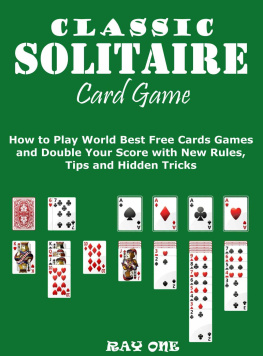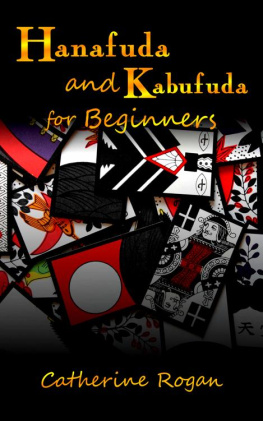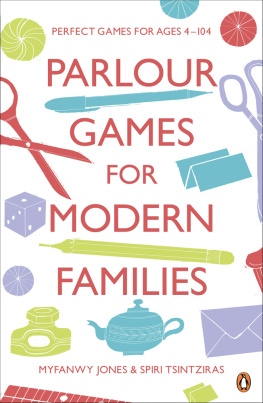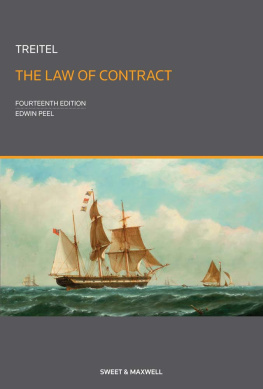NAP, OR NAPOLEON.
The game of Napoleon, or as it is more generally and popularly called Nap, was introduced into this country from the United States, it is believed, about 1865, although it is recorded that the game had previously been played for high stakes at some of the more notorious gambling clubs.
It is named after the great Napoleon, as the principal player in the game becomes, for the time being, an Ishmaelite, whose hand is against every mans, and every mans against his, as was the case with the Grand Adventurer in 180415 (see Variations)whence we have the terms Wellington, Blcher, etc.
It is an admirable game for three, four, or five persons, and is also available for two and six, though four is the ideal number, and it is played with an ordinary pack of fifty-two cards. (For Nap with thirty-two card pack, see page 14). With six persons taking part in the game the dealer stands out of the play, not dealing any cards to himself, though he receives and pays for the tricks like the others, and the same system is sometimes adopted when there are five players; as, if all the players took active part in the game, it would become most difficult to make the tricks, because more cards would be in use.
The popularity of the game is no doubt owing to the short time necessary for playing the hands, and to the fact [4] that it can be terminated at any moment, for no game or deal need exceed two or three minutes, except when a pool or kitty is introduced (see Variations). In this case provision has to be made for the distribution of the amount of the kitty.
While care in playing is necessary, no great amount of skill is required to render the game diverting as an amusement, while it also affords ample scope for the exercise of speculation and the other elements of excitement.
DESCRIPTION.
The main idea of the play, as already stated, is for one of the competitors to stand against the united efforts of the others, who, in turn, use their powers to prevent his securing the object for which he is strivingin this case to win the whole or a certain number of tricks. The number of the tricks to be won is variable, and it depends on the value of the cards in each players hand to decide what number he will endeavour to secure. The greatest possible achievement is to win the whole of the tricks (which are five in number), and theplayer who succeeds in doing this scores a Nap, and receives double stakes from each of his companions; if however, after declaring his intention to try for Nap he fails, he only pays a single, i.e., for five tricks; and, as will be shown later on, this condition attaching to a Nap becomes an important feature in deciding on the number of tricks to be played for, when a good hand is secured.
The only safe and perfect Nap is ace, king, queen, knave, and ten of the same suit, but as this combination of cards does not often occur in actual practice, it remains for the player to speculate on his chances with the cards he holds. [5]
It is this speculation of possibilities which forms the principal feature of the game, and it is the ability of a competitor to make an immediate decision on this point that governs his success or failure in its practice. Very much, however, depends on the temperament of the player. A bold, enterprising person will risk much in the hope of winning much, and one player will declare for Nap on the same cards which another would consider only safe for three tricks, and, in like manner, one will declare for three tricks where his neighbour would hesitate to risk two.
Another important matter for consideration is the number of players engaged, and the consequent proportion of cards in use. Each player receives five cards, so that it follows, with three players engaged, that fifteen are in use, and thirty-seven remain in the pack unexposed; whereas if five are playing there are twenty-five cards in use, and only twenty-seven remaining unexposed. The calculation necessary is, therefore, as to the probability of certain superior cards being in the hands of the opponents, or remaining in the undealt surplus of the pack.
TACTICS.
As a perfect Nap is of such rarity we must content ourselves with substitutes, and in this respect we may regard the following combinations as good ordinary hands on which to declare for the full number of tricks: a flush of fairly high cards, i.e., the five all of one suit; four of one suit (headed with ace or king), and one high card of another suit; or three high cards of one suit, with two high cards of a second suit. It is dangerous to risk a Nap on a hand of three suits, unless it consists of three high cards of one suit with two other aces; then it is often possible to [6] win the five tricks, by first exhausting the trumps, and then playing the aces, which must win; but if one of the opponents starts with four trumps, no matter how small, success is, of course, impossible.
If a player does not consider his cards good enough to permit of his declaring for Napand it is fair to suppose that not once in a hundred they will be absolutely safehe has to decide what they are worth, and declare accordingly. It is not often that four tricks are called, because a hand good enough for four is usually regarded as sufficiently good for Nap, on account of the additional stakes received by the player who succeeds in making the whole of the tricks, which amount to a difference of six points from each competitor, as for four tricks he receives four, while for Nap he receives ten, paying only five, however, if he loses.
On the same principle as already shown in regard to a perfect Nap, it will be understood that ace, king, queen, is the only certain combination with which to secure three tricks, but these cards, again, are seldom met with in a hand, and speculation is once more the principal matter for consideration. Ace, knave, and ten of a suit is generally good for three tricks, as the only possibility against such a combination is that one of the other players holds king or queen of the same suit, with a smaller trump to throw away when the ace is led. Three tricks are, however, often called on much lower cards than ace, knave, ten, especially when the other cards in the hand are of one suit, or are sufficiently high to admit of the possibility of one of them securing a trick. The same line of reasoning holds good in regard to a declaration of two tricks, the only certainty in that case being ace and king.
It must not be considered, after these comments on the game, that there is any great difficulty to surmount in acquiring [7] a knowledge of Napoleon. As we said at the commencement of our remarks no great skill is essential, but considerable care is necessary to secure anything like success at the game, the chief factor in which is so-called luck. It is impossible to make tricks, or even declare an intention to try for them, unless one receives a certain number of high cards. One may even go further, and say that luck goes far beyond the actual cards dealt to each player, for the best of hands often fail, and poor cards frequently achieve success; whilst it happens, in numerous cases, that the playing of the cards demonstrates that really weak hands would have secured success if the holder had had the pluck, or impudence, we may term it, to declare more than the value of the cards seemed to justify. On the other hand it is often astonishing to find the number of high cards of a given suit included among the fifteen, twenty, or twenty-five in the hands of the players engaged in the game.












